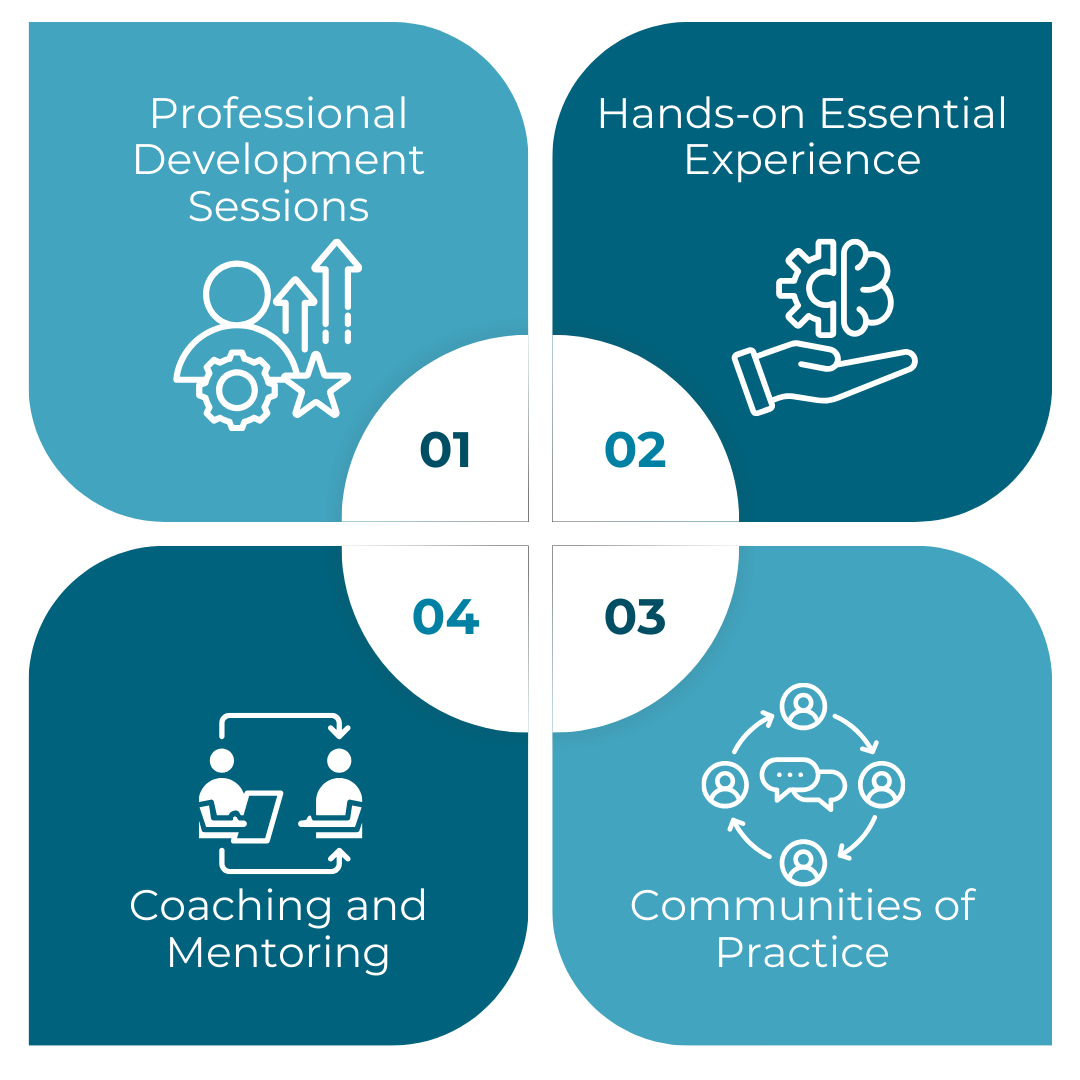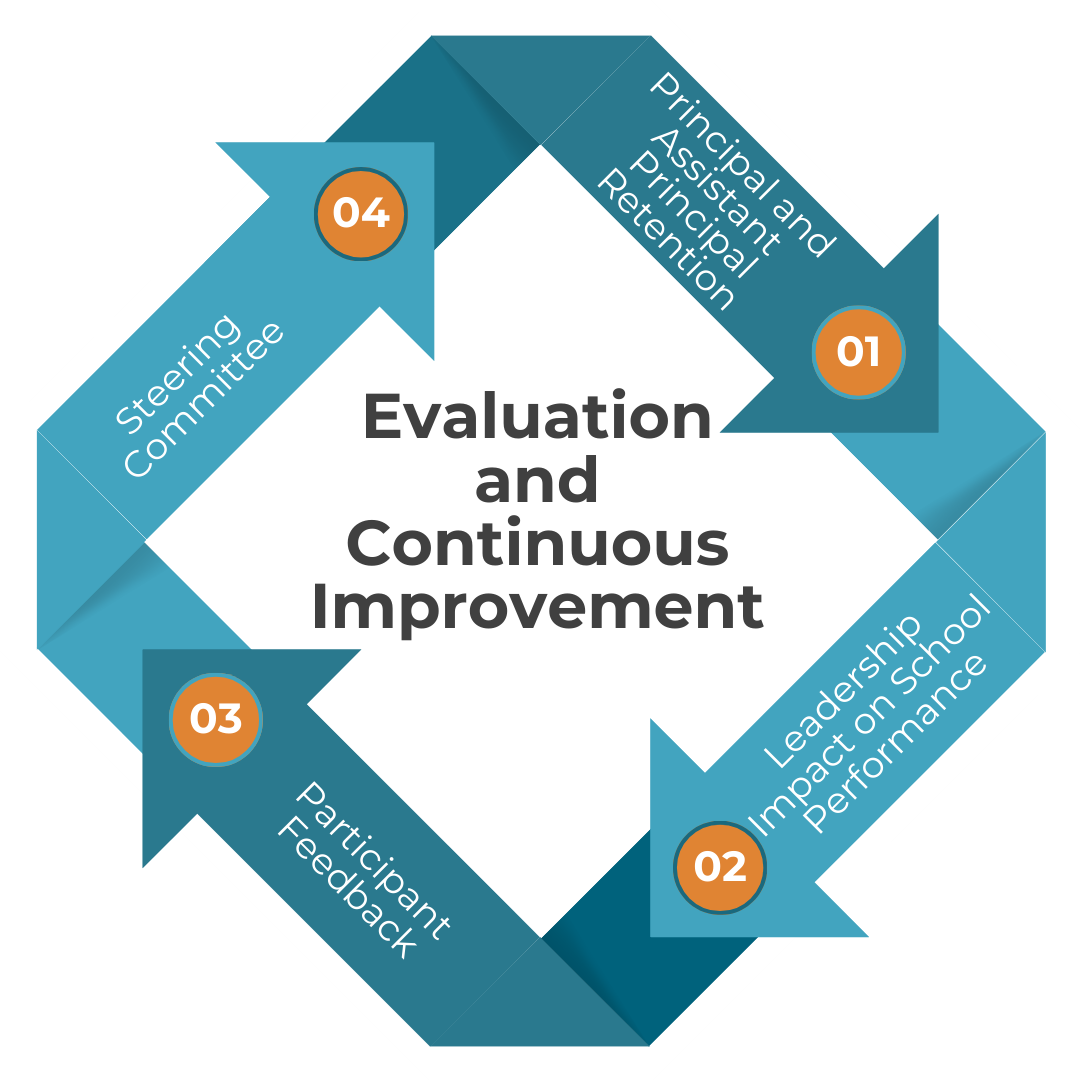- APS Human Resources
- Department of Leadership Development
Leadership Development
Page Navigation
Definition of Leadership Excellence
-
The Definition of Leadership Excellence framework outlines the core principles and standards that guide our leadership development initiatives, ensuring our leaders are well-prepared to meet the challenges of modern education. It is the cornerstone of our leadership development initiatives. It focuses on six core domains:
-
- Lead with Courage: Inspire and sustain others with a clear vision, authentic relationships, and a commitment to diversity.
- Beliefs and Values: Embody the guiding principles and values of Atlanta Public Schools.
- Lead Academics: Promote academic excellence and prepare students for college and career readiness.
- Manage Operations: Efficiently manage financial and operational resources to support teaching and learning.
- Develop People: Equip and empower staff with the skills and resources needed to achieve our vision.
- Build Culture: Foster a supportive, inclusive, and collaborative school culture.

Four Pillars
-
Four Pillars of Leadership Development
Informed by Malcolm Knowles' Adult Learning Theory, APS's leadership programs are built on four pillars:

- Professional Development Sessions: Ongoing, targeted learning opportunities designed to enhance leadership skills aligned with the district's strategic plan and research from the Wallace Foundation.
- Hands-On Essential Experiences: Real-world leadership experiences, such as school-based projects and shadowing, to apply learning in authentic settings.
- Coaching and Mentoring: Facilitative coaching and mentorship to develop both adaptive and technical leadership skills.
- Community of Practice: A collaborative network for principals and assistant principals to share best practices, discuss challenges, and problem-solve.
These pillars ensure that APS leaders are well-prepared, continuously supported, and equipped to meet the challenges of modern education.
The Research
-
Research-Based Leadership Development
APS's leadership development programs are grounded in extensive research, ensuring our leaders are well-prepared to drive school success and improve student outcomes.

- Wallace Foundation Principal Support: Highlights the critical role of principals in school success. Effective coaching, mentoring, and professional development support are essential for student achievement and principal retention. The Wallace Foundation recommends following the Principal Pipeline research best practices for consistent leadership development.
- Marzano School Leadership: Emphasizes the importance of effective school leadership in improving student learning outcomes. Marzano's framework focuses on setting goals, managing operations, and promoting a positive school culture.
- Georgia LKES and PSEL Standards: APS aligns its efforts with the Georgia Leadership Keys Effectiveness System (LKES) and the national Professional Standards for Educational Leaders (PSEL), providing a clear framework for evaluating leadership performance and meeting high expectations.
- School Improvement for All (2017) Stresses that school improvement requires collective leadership from the entire school community. APS's programs emphasize distributed leadership and empowering teachers and staff to contribute to school improvement efforts.
By integrating these research-based insights, APS ensures its leadership development programs are effective, comprehensive, and aligned with best practices.
Evaluation
-
The APS Department of Leadership Development uses a comprehensive evaluation framework to measure the effectiveness of its programs. This includes:

-
Principal and Assistant Principal Retention: One of the primary goals of leadership development is to retain high-quality leaders. APS tracks retention rates and seeks to understand the factors that contribute to leaders leaving or staying in their positions.
-
Leadership Impact on School Performance: APS evaluates how leadership development translates into improved school performance, using metrics such as student achievement, school climate, and teacher retention.
-
Participant Feedback: APS regularly solicits feedback from program participants to identify areas for improvement. This feedback informs program modifications and helps ensure that leadership development remains responsive to the needs of school leaders.
-
Steering Committee: APS has established a steering committee composed of district leaders, external partners, and leadership development experts. The committee is tasked with guiding the continuous improvement of leadership development programs and ensuring that they align with the district’s strategic goals.
-
Programming
-
Signature Leadership Development Programs
APS offers a range of signature leadership development programs to build and sustain a robust pipeline of leaders at every level of the district:

- Aspiring Assistant Principal Program (AAP)/Instructional Leadership Development Program (ILDP): Prepares teachers, instructional coaches, and aspiring leaders for the role of assistant principal, focusing on self-awareness, instructional leadership, building culture, operations, and other essential leadership competencies.
- Aspiring Principal Program (APP): Designed for experienced assistant principals, this program provides the training and mentorship needed to become a principal. It emphasizes self-awareness, culture-building, data-driven decision-making, equity, and operational and community leadership.
- New Leader Induction: Offers intensive support for new principals and assistant principals during their first two years on the job, including coaching, mentoring, and professional development tailored to their unique challenges.
- Black and Latino Male Leadership Initiative: Focuses on developing male leaders of color by addressing unique challenges and barriers. Participants engage in professional learning and receive coaching and mentorship from seasoned leaders of color.
- Principal Coach Collaborative (PCC): An innovative coaching collaborative designed to support current principals. Using research from the Wallace Foundation and Blended Coaching enhances principals' technical and adaptive leadership skills in years 1-5.
- Sitting Leader Development Opportunities: Provides ongoing development for experienced school and central office leaders, focusing on emerging issues related to adaptive leadership, equity in education, and community engagement.
Join our programs to become a leader who drives student success and fosters a positive school culture!
Leadership Pipeline
-
Building a Strong Principal Pipeline
A strong principal pipeline is essential for improving student achievement, teacher satisfaction, and school effectiveness. According to the Wallace Foundation, an effective principal pipeline includes:

- Leadership Standards: Clear, rigorous expectations for school leaders.
- Pre-Service Preparation: High-quality training for aspiring principals.
- Selective Hiring and Placement: Structured hiring practices to select the best candidates.
- On-the-job support and Professional Development: Mentoring, coaching, and ongoing professional development.
- Performance Evaluation: Regular assessments focused on improving student achievement.
- Data-Driven Decision-Making: Using data to monitor principals' development and performance.
- Sustainability: Integrating the principal pipeline into district policy and practice for long-term success.
Collaborative Partnerships
APS's leadership development efforts are strengthened by partnerships with key stakeholders:
- Human Resources: Identifies leadership talent and supports recruitment.
- Finance and Operations: Ensures leaders have the resources to implement their vision.
- Teaching and Learning: Aligns leadership programs with instructional priorities.
- Strategy and Engagement: Aligns leadership initiatives with strategic goals and fosters stakeholder engagement.
External Partners
APS collaborates with several external organizations to enhance leadership development:
- Georgia State Principals Center: Provides professional development and networking opportunities.
- Mercer University and Georgia State University: Offer academic support, professional development, and certification for APS leaders.
- Men of Color in Education Leadership (MCEL): Supports Black and Latino male leaders through mentorship and advocacy.
- Northstar Ed Partners: Enhances leadership programs with expertise and aligns them with strategic goals.
- Pavon Firm: Specializes in coaching and leadership development, particularly in educational settings.
These partnerships ensure that APS's leadership development programs are comprehensive, well-supported, and aligned with best practices. Join us to become a leader who drives student success and fosters a positive school culture!
Coaching and Mentoring
-
The Importance of Coaching, Mentoring, and Building a Leadership Bench
Coaching and mentoring are vital components of APS's leadership development strategy. Research from the Wallace Foundation shows
 that coaching is one of the most effective ways to support principal growth and retention. By providing principals and assistant principals with access to skilled coaches and mentors, APS ensures that leaders have the support they need to succeed.
that coaching is one of the most effective ways to support principal growth and retention. By providing principals and assistant principals with access to skilled coaches and mentors, APS ensures that leaders have the support they need to succeed.Building a strong leadership bench is also essential for filling leadership vacancies as they arise. APS's Aspiring Principal and Aspiring Assistant Principal programs are designed to identify and develop leadership talent from within the district, ensuring a ready pool of qualified candidates for future leadership positions.
The Atlanta Public Schools Department of Leadership Development is committed to developing strong, effective school leaders who drive student success and foster a positive school culture. By grounding leadership development in the district's Definition of Leadership Excellence and Leadership Readiness Criteria and focusing on the four pillars of adult learning, APS is building a robust leadership pipeline for the future.
Through partnerships with internal departments and external organizations and with a strong focus on coaching, mentoring, and continuous improvement, APS ensures that its school leaders are well-prepared to meet the challenges of modern education. Join us to become a leader who makes a difference!










